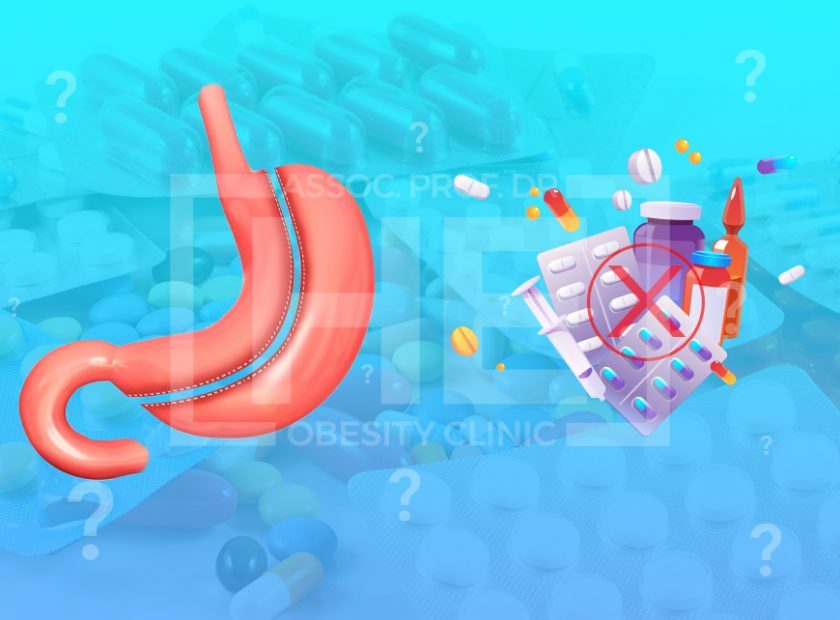
What are the metabolic effects of sleeve gastrectomy? Gastric sleeve surgery can have many positive or negative effects on the patient. Negative effects can be minimized by taking precautions. We would like to talk about the metabolic effects of sleeve gastrectomy.
The extracted part of the stomach is the part that produces the hormone Ghrelin, which triggers hunger. Removing this part reduces the amount of hormone that stimulates appetite in the blood and usually causes appetite suppression.
Sleeve gastrectomy, contrary to popular belief, does not work only by restricting food intake; at the same time, the operation has very important hormonal and metabolic effects. First, because the volume of the stomach decreases, less food is taken than before. But it’s not like diet.
You don’t go hungry, you go full. A small amount of food is enough for you to eat. Again, a hormone called Ghrelin, also known as appetite hormone, is secreted from the fundus part of the stomach. Appetite is also significantly reduced with the removal of this part of the stomach.
Again, there are different hormonal effects that are secreted from the stomach and act on the intestines, the mechanism of action of which is still being investigated.
Although the exact form of this effect is unknown, the final effect is seen in serious improvement in problems such as sugar blood pressure, even before weight loss begins after surgery.
Metabolism in gastric sleeve surgery
In gastric sleeve or other obesity and metabolic surgery, it is not the weight limit, but the height weight ratio called Body Mass Index.
This ratio is calculated by dividing the neck by the square of the weight, when The Body Mass Index is in the December 30-35, a screening for pro-disease or metabolic syndrome is performed for Metabolic Surgery.
BMI of 30 and above, and in addition in patients with diabetes or metabolic syndrome, obesity and Metabolic Surgery is the method of international health agencies, gastric sleeve, gastric bypass, and all other methods have been proposed.
In order to be able to say that there is a metabolic syndrome, tests such as lipid, insulin, fasting blood sugar in the blood in patients and the presence of high blood pressure, values such as waist circumference are looked at.
In the success of gastric sleeve surgery, it is of great importance for the patient to adopt a new lifestyle, to adhere to the diet program created in cooperation with specialists in metabolism and endocrinology, to regularly use nutritional, vitamin and mineral supplements if necessary.
Following the rules of nutrition after gastric sleeve surgery is very important for both the smooth progress of the healing process and for weight loss at the targeted rate.
Nutrition after gastric sleeve surgery is generally considered in 3 stages; liquid nutrition period, mash nutrition period and solid nutrition period. Although each period has separate dynamics, the main goal is to get used to the new structure of the stomach and to ensure that patients can get the necessary nutrients.
After gastric sleeve surgery, a grain-free clear liquid diet is applied during the liquid nutrition period. During this period, known as a first-line diet, it is important that patients stay away from liquids containing sugar.
During the feeding period with clear liquid, patients can consume liquids such as protein drinks, chicken broth, buttermilk, broth. The second stage of nutrition after gastric sleeve surgery is the mash diet period. During this period, both liquid foods can be consumed and pureed forms of solid foods can be preferred.
Vegetables and meat cooked by healthy cooking methods can be consumed in small bites by passing through the blender. During this period, the consumption of all nutrients in the liquid diet process can be continued. After gastric sleeve surgery, all solid foods that are healthy can be consumed in the solid nutrition process.
But the separation of solid and liquid needs to be made clearly. After obesity surgeries, it is important that patients do not consume fluids 30 minutes before meals until 30 minutes after meals. Metabolic effects of sleeve gastrectomy may vary completely according to the patient’s diet.
How to boost metabolism after gastric sleeve?
Gastric sleeve surgery is not just a method that restricts eating or makes it easier to diet, it is a type of surgery that creates a very powerful change by formatting the metabolism. To boost your metabolism, you should consume plenty of fluids.
In the nutrition program provided to you, there are already such features. So you may not even need to do anything extra. With proper nutrition, abundant water consumption and the right food, metabolism will boost. Patients should be supported so that there is no high loss of protein and vitamins during these few months.
Here, especially after obesity surgery, it is recommended to consume at least 1.5 liters of water regularly every day until the recovery process is over. Thanks to this, the metabolism works more smoothly, and the healing process can be shifted to an earlier time.
Especially in the first 1 month, a nutrition program should be included in the process, accompanied by professional nutritionists, and the blood-thinning needle should also be continued.
In addition to nutrition, the patient should definitely play sports regularly for the first 1 month, and in this context, options such as cardio, that is, cycling, should be evaluated along with swimming.
Does Gastric Sleeve Affect Metabolism?
If you’re wondering if gastric sleeve surgery can alter your metabolism, you’ve come to the right place. The procedure requires lifelong changes to your eating habits.
You must commit to a liquid-based diet for the first two weeks after surgery, then graduate to a solid diet of 600-800 calories per day. Once you’ve adapted to this, you can eat as much as 1000 calories a day, depending on your weight and other factors.
In a meta-analysis, Vest et al. analyzed data from 73 published articles regarding bariatric surgery. Among them, only 10 reported information on LSG.
The follow-up period was between three and fourteen months, and the results showed a significant reduction in the rate of diabetes, hypertension, hyperlipidemia, and dyslipidemia over that time. In addition, the authors of the review looked at the long-term effect of LSG on hypertension and the risk of diabetes.
Studies show that the surgery can improve metabolism, reducing feelings of hunger. It does this by reducing the production of ghrelin, the hormone responsible for appetite.
Instead, the sleeve surgery increases the production of leptin, a hormone that satisfies our hunger. As a result, some patients report no longer needing medications for weight-related conditions.
Researchers also reported that a sleeve surgery may alter hormone levels. These hormones play a vital role in controlling appetite.
The surgery also alters the nerve signals that trigger feelings of fullness and satiety. In addition to this, it causes a new set point in body weight. As a result, patients’ post-operative curves cross over the set point body weight




